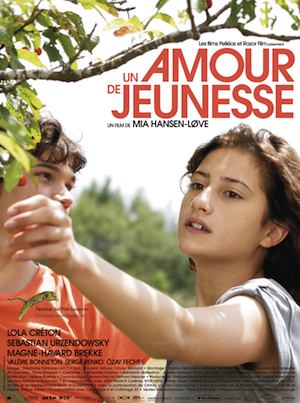Film Review: Un Amour de Jeunesse (Goodbye First Love)
- SUBSCRIBE
- ALREADY SUBSCRIBED?
BECOME A BONJOUR PARIS MEMBER
Gain full access to our collection of over 5,000 articles and bring the City of Light into your life. Just 60 USD per year.
Find out why you should become a member here.
Sign in
Fill in your credentials below.

Un Amour de Jeunesse (Goodbye First Love) is a film you want to like and that you suspect wants to be liked, and you do like it, sort of. It’s even a fairly good film, but not as good as its reception in Paris would indicate.
Lola Créton plays Camille, a plain but affecting girl in her mid-teens. She looks like the type of girl who would be a good daughter and diligent student, not really given to obsessive love, unless she happened to meet one of the Jonas Brothers. Sullivan (played by Sebastian Urzendowsky, who’s in his mid-twenties) actually looks like a Jonas brother, which might explain things. He’s charming and curly-haired, sincere but elusive. They are rapturously in adolescent love, given to physical friskiness and soulful conversations about the meaning of it all as they make their way around Paris.
Director Mia Hansen-Love is very good filming an unidealized Paris, as well as the hum-drum suburb where Sullivan’s family lives. Parents, teachers, and friends are shot in a thin, affectless way—like a student filmmaker using non-actors. Maybe that’s intentional, in which case, these two young people’s rather dreary existence (and promise of a dreary future) may be part of what drives them. Sullivan does have friends, and a dream: to go to South America on a 10-month backpacking voyage of discovery. Camille only has Sullivan, and she wallows in threats, suicidal tendencies and plain sulkiness at the thought of the upcoming separation. We take Sullivan at his word when he says he wants to discover life. But we also wonder if he needs to get away from his sweet but smothering girlfriend.
 The couple go for an idyll in the Ardèche, which provides the director with an opportunity to indulge in very pretty photography. Aside from that (and perhaps the subsidies France’s regions dole out to filmmakers), the scenery represents the young lovers’ utopia. It seems practically empty, and they happen on a bucolic house (“the house of my dreams,” says Camille) that is also empty, waiting for them. Nothing much happens, except Sullivan feels the need for a short escape, going for a swim without Camille. She doesn’t contemplate suicide but does provoke a spat—or maybe it’s Sullivan who really provoked it, not ready to turn l’amour into la vie à deux. (They haven’t yet figured out, like the French bourgeoisie, that utopia is where you take your holidays.)
The couple go for an idyll in the Ardèche, which provides the director with an opportunity to indulge in very pretty photography. Aside from that (and perhaps the subsidies France’s regions dole out to filmmakers), the scenery represents the young lovers’ utopia. It seems practically empty, and they happen on a bucolic house (“the house of my dreams,” says Camille) that is also empty, waiting for them. Nothing much happens, except Sullivan feels the need for a short escape, going for a swim without Camille. She doesn’t contemplate suicide but does provoke a spat—or maybe it’s Sullivan who really provoked it, not ready to turn l’amour into la vie à deux. (They haven’t yet figured out, like the French bourgeoisie, that utopia is where you take your holidays.)
The big separation follows, as well as Camille’s inevitable suicide attempt. Then something strange happens: the separation doesn’t last 10 months, but years. This isn’t well-explained, or very plausible. Camille becomes interested in architecture and gets immersed in studies and jobs. The years are telescoped, like the old Hollywood films where calendar pages flip by, except here we have representative scenes. The problem is that Camille still seems to be 16 years old (Lola Créton is actually 17). Physically and behaviorally she isn’t different—she’s like a teenager playing an adult in a school play.  She gets involved with an older German architect (Magne-Havard Brekke), who’s worldly-wise and craggily handsome. Supposedly she evolves into a successful adult, but her bizarre appearance makes us think that either she’s a child at heart (good) or has never grown up (bad). In either case it doesn’t really work.
She gets involved with an older German architect (Magne-Havard Brekke), who’s worldly-wise and craggily handsome. Supposedly she evolves into a successful adult, but her bizarre appearance makes us think that either she’s a child at heart (good) or has never grown up (bad). In either case it doesn’t really work.
After all these years, Sullivan makes his reappearance. And he also looks the same! He has the same haircut, the same clothes, and although he now lives in Marseille, when he pops up in Paris he rides the same bike. They resume their interrupted affair, but Sullivan proves as feckless as ever. This must have an appeal for many people—we’re reminded of all those one-time sweethearts who find each other again on Facebook. But what’s sweet in the context of youth gets cloying and tiresome, and somehow nightmarish. It’s like the movie Groundhog Day, the same situation endlessly repeating with no development. Perhaps that’s why some of us, after flirting with the rediscovery of family and friends on the ‘Net, tend to recoil.
By the end of Un Amour de Jeunesse, when we are driven to distraction by the feyness of Camille and Sullivan’s love story, we realize who they remind us of: Peter Pan and Wendy. It might be nasty to suggest that they grow up. But at the very least, the film could have used some Tinker Bell or even Captain Hook.
Production: Les Films Pelléas/Razor Film Produktion GmbH/Arte France Cinéma
Distribution: Les Films du Losange (France), Sundance Selects (US)
View movie trailer at cineuropa.org [French only]
Dimitri Keramitas is a Paris-based film writer who reviews the latest film releases for BonjourParis every other Wednesday. Most recently he reviewed La Conquête.
Sign up now for your own free subscription to BonjourParis & we’ll send you Wednesday & Sunday newsletters that link to original France travel stories, news, recipes and travel photography. 50 original stories monthly from your most complete online France travel & Francophile lifestyle eZine. RSS feed available.

One-stop shopping for air, hotel & car rental deals:
To rent a car with a 5% discount for BonjourParis.com readers, click Auto Europe Car Rental
To rent a hotel, click Auto Europe Hotels
To buy international flights, click Auto Europe Flights
If you can get it from Amazon.com, you can get it at the BonjourParis Amazon.com Boutique. Same unbeatable pricing, same speedy delivery and a few centimes of your purchases support BonjourParis, your most complete online France travel resource. Merci in advance!
Search hint: start at the back pages of each category for the most recent stock.
Until you return to Paris, no need to do without your French favorites, like: Roger & Gallet “Rose” scent….Chanel “Gabrielle” red lipstick…Gaultier for him are just a few of the French brands you can get in our Cosmetics, Parfum & Accessories Department

More in Cannes film festival, film review, French film, movie, Paris films




